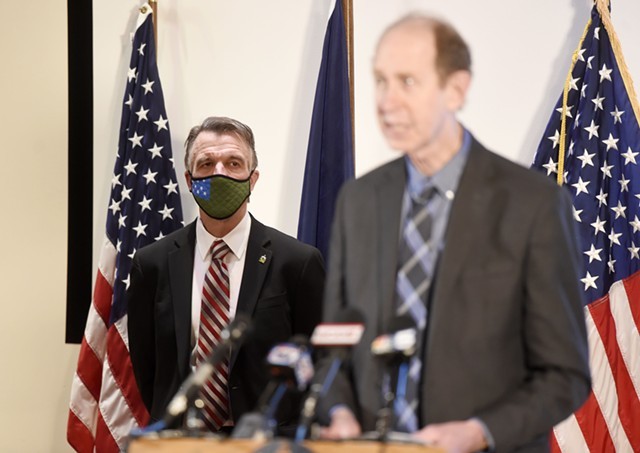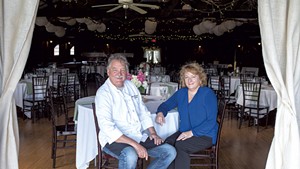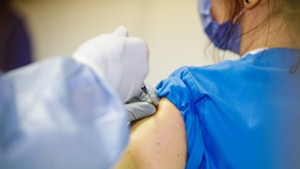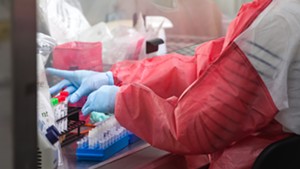
- File: Jeb Wallace-Brodeur
- Gov. Phil Scott and Health Commissioner Mark Levine at a previous briefing
With a healthy supply of vaccine headed Vermont's way, Gov. Phil Scott said on Tuesday that he expects the state to be close to normal around the Fourth of July, a dramatic improvement in expectations.
Hospitality businesses and the organizers of fairs and parades have been wondering if they’ll be able to host events at all this summer. And while Scott didn’t make any guarantees, he floated a hypothetical where most Vermonters would have received or been registered for a COVID-19 vaccine by the end of May. If that happens, summer could look more like it did in 2019, he said.
“There are a lot of things that come into play with this,” the governor cautioned.
“But from my standpoint, it’s almost like we’re back to where we were pre-pandemic in terms of having businesses open and being able to freely travel throughout the United States,” Scott said of midsummer during one of his twice-a-week COVID-19 briefing.
Scott takes part in a virtual meeting most Tuesday mornings with other governors and the White House, and he often delivers news from that briefing. This week's update included good news about vaccine supply, which the governors were told would increase nationwide and in Vermont over the next weeks.
“This is the assurance we’ve been waiting for,” Scott said.
Hospitality businesses have been waiting for a different kind of assurance: A firm date that they can tell prospective guests it will be possible to book a stay and travel from out of state without quarantining.
State officials didn’t provide anything like that on Tuesday. But Scott said he plans to release information on Friday about the next phases of the vaccination process, which has been rolled out according to age, to educators and to Vermonters with conditions that put them at higher risk of complications. The state opened registration for people ages 65 and over on March 1.
The state will publicize the vaccination schedule for everyone else, starting with age 60 and over, on Friday, Scott said. By the first week in April, “we’ll be publicly showing you what our exit strategy is,” he said, referring to the lifting of restrictions on businesses and social gatherings that are in place to limit the spread of the virus.
“A lot of those timelines and gathering limits and so forth, will be in that strategy. It will be apparent at that point what you can do,” he said.
Lodging businesses that are getting calls from guests now would like more information, and sooner.
“I am not going to see the same revenue numbers if there is an ‘if’ attached to the equation, because that means there is something prohibiting my ability to operate the way I once did,” Brian Maggiotto, who owns the Inn at Manchester with his wife, told
Seven Days after Tuesday's briefing.
“We can say things look and feel good, but there should be no misconception that businesses are going to be impacted as long as there is a restriction or guideline that is being followed,” Maggiotto said. “It’s not right or wrong, that’s the reality.”
Aside from laying out what the next weeks and months are going to look like, the Scott administration must also promote inoculation to the general public, especially younger Vermonters. In the last week, the state administered 7,000 vaccinations on a single day, the highest number so far, said Michael Pieciak, the commissioner of the Department of Financial Regulation. The state’s seven-day average is at 5,000 vaccinations per day, a 20 percent increase over the week before, Pieciak said.
Older Vermonters have shown strong support for the vaccination program, with 85 percent of people age 75 and older receiving at least one dose, Pieciak said. More than 80 percent of those ages 70 to 74 have had one or two doses, and those age 65 to 69 are at 50 percent, he said. The state is planning a marketing campaign to get younger people on board.
Vermont is seeing around 100 new cases of the virus each day. Pieciak said the long-term expectation is that the case numbers will start to fall toward the beginning of April, and continue dropping.
“The single greatest item impacting our COVID-19 data, impacting our outlook, is the number of Vermonters who have been willing to be vaccinated,” Pieciak said. “The higher these percentages go, the faster and more normal our recovery will be.”
Maggiotto said he welcomed any news that would generate excitement about the summer.
But “we still need a date,” he said. “We hear you, governor, I appreciate that, but if I am planning to do something on May 15, I still don’t know if I can.”
“There are so many moving pieces to travel, whether it’s purchasing tickets to an attraction, making overnight reservations,” Maggiotto said of his guests. Uncertainty about opening dates “will leave you hesitant to do it in the state of Vermont compared to some of our neighbors.”
















Comments
Comments are closed.
From 2014-2020, Seven Days allowed readers to comment on all stories posted on our website. While we've appreciated the suggestions and insights, right now Seven Days is prioritizing our core mission — producing high-quality, responsible local journalism — over moderating online debates between readers.
To criticize, correct or praise our reporting, please send us a letter to the editor or send us a tip. We’ll check it out and report the results.
Online comments may return when we have better tech tools for managing them. Thanks for reading.